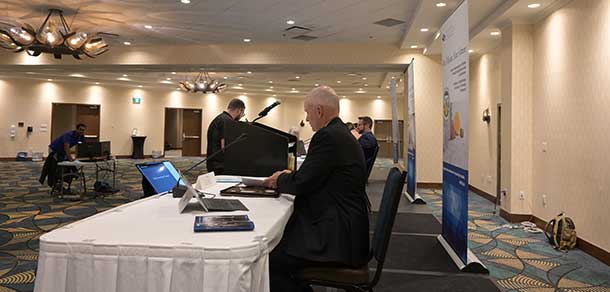Mark Twain would have been proud of the organizers of the Continuing Professional Development plenary session. Phrases like “required reporting” and “plenary session” strike one as being unpleasant chores. but, like Tom Sawyer convincing his friends to help him paint the fence, the organizers of the plenary session succeeded in creating a fascinating and eye-opening presentation on the dangers and opportunities of the issue of reporting Continuing Professional Development (CPD).
The key issue of the session is one that will be familiar to readers of The Professional Edge. Although APEGS regulations require minimum annual hours of CPD, reporting those hours has so far been voluntary. This makes APEGS’s CPD requirements a toothless tiger. Without confirmed information on compliance, there is no way to enforce them.
PART ONE:
Presentation from Engineers Canada

The CPD plenary session began with a presentation by Chris Roney, P.Eng., FEC, president of Engineers Canada, on why CPD is needed in the first place. Ethics and competence are taken as givens amongst engineers and geoscientists but Roney outlined three recent examples in which ethics and competence were lacking, with disastrous results.
The first was the Elliot Lake Mall roof collapse in Ontario in 2012. Roney brought home the extent of this disaster by showing live footage captured from a security camera at the exact moment of the collapse. The report that followed the inquiry noted that there had been years of overly optimistic engineering reports and make-do patches to serious structural issues. An engineering report issued just two days before the collapse declared the building structurally sound. Even during the construction phase, the mall had a history of dangerously unsafe cost-cutting and building practices. The report included the damning statement that “the engineers pandered more to their clients than to their moral obligations.” As one of the outcomes of the final report, engineers in Ontario are now obligated to report an incompetence ruling to all of their clients – past, present and future.
Next, Roney reviewed Quebec’s Charbonneau Commission’s investigation into the sordid history of corruption and incompetence among Quebec engineers. The commission investigated a long-running and complex scheme of bribes and bid-rigging among Quebec engineers and contractors which included the involvement of corrupt politicians, civic officials and organized crime. The result is that innumerable infrastructure projects in Quebec are sub-standard. The long-term costs to Quebec society have not yet been fully assessed. As for Quebec engineers, their level of public support and trust has dropped to an all-time low.
Finally, Roney looked at the Mount Polley Dam collapse in British Columbia in 2014. Inadequate inspection and flawed geotechnical assumptions contributed to the collapse of a tailings pond dam, resulting in the release of over 15 million cubic metres of toxic waste and causing effectively permanent environmental damage.
All of these cases show that engineers and geoscientists must not only maintain the highest level of ethical integrity but must also be transparent and be prepared to prove to the public that they are constantly maintaining this integrity.
“It takes years for a profession to build a reputation but that trust can disappear in a day,” Roney said.

PART TWO:
Panel Discussion
The second half of the CPD plenary session featured a Q&A session with a panel that gathered objective perspectives from outside Saskatchewan and outside the professions. These included Grant Koropatnick, P.Eng., FEC, CEO and registrar of Engineers and Geoscientists Manitoba (which has required reporting), Leigha Hubick, CPA, director of regulatory affairs, Chartered Professional Accountants (CPA) Saskatchewan (which has long had required reporting) and Chris Roney, P.Eng., FEC from Engineers Canada. Shawna Argue, P.Eng., FEC. FGC(Hon), APEGS’s Director of Education and Governance, served as moderator.
Some of the questions fielded by the panel included:
Why is required reporting important?
Koropatnick noted that, in the age of the Internet, people are asking more questions, seeking more information and watching more closely than ever before. This atmosphere of heightened inquiry not only applies to the public but to the media. In one case in Manitoba, there was a construction scandal in which the competence of an engineer was involved. Because the association was able to track and prove the member’s CPD, the association was able to “have his back,” reach out to the media and demonstrate that the competence allegations were groundless.
Hubick stated that, for their association, required reporting was a straightforward necessity for establishing and maintaining public trust.
Roney underlined this by noting that required reporting is, ultimately vital for APEGS to preserve its status as a self-governing body. “If the public ever learned that a P.Eng. designation was essentially a licence for life, that there was no enforceable requirement for ongoing learning, they would be outraged and demand changes.” He gave the examples of Quebec where the OIQ is now under provincial trusteeship and Ontario where the government imposed CPD rules on the association.
How do members react to the advent of required reporting?
Hubick said that, for her profession it was a non-event. Members understood the need for it. She also observed that the process in the CPA association, while detailed, is not onerous and, in any case, is a once-a-year chore.
Roney stated that, in Ontario, when the need for the practice was explained, resistance faded and it is now broadly accepted.
Koropatnick echoed Roney’s observation about the need for explanation and education. Manitoba is in the second year of required reporting. In the first year, it had 60 per cent compliance. In the second year, it had 98 per cent.
What are the consequences of non-compliance?
In the CPA, members must pay a small late fee if they don’t get their reports in on time. If the problem persists and members don’t submit their annual report at all, their licence is suspended until they comply.
In Manitoba, members are sent several reminder notices and are then suspended if they do not respond.
Roney noted that the Law Society of Manitoba had faced similar issues. One lawyer challenged the Law Society’s right to suspend him over CPD issues and fought the issue all the way to the Supreme Court of Canada. The Supreme Court upheld the Law Society’s right to suspend members over CPD.
PART THREE:
Turning Risks into Opportunities
The session concluded with Koropatnick re-emphasising the benefits of transparency for building public trust and for converting potential pitfalls into opportunities to enhance the professions’ reputations.
“If a member ever comes under any sort of media scrutiny, strong competence measures such as required reporting gives the association the ability not only, if appropriate, to defend the member but also creates an opportunity to educate the public about the strict standards and ethics of the association.”
